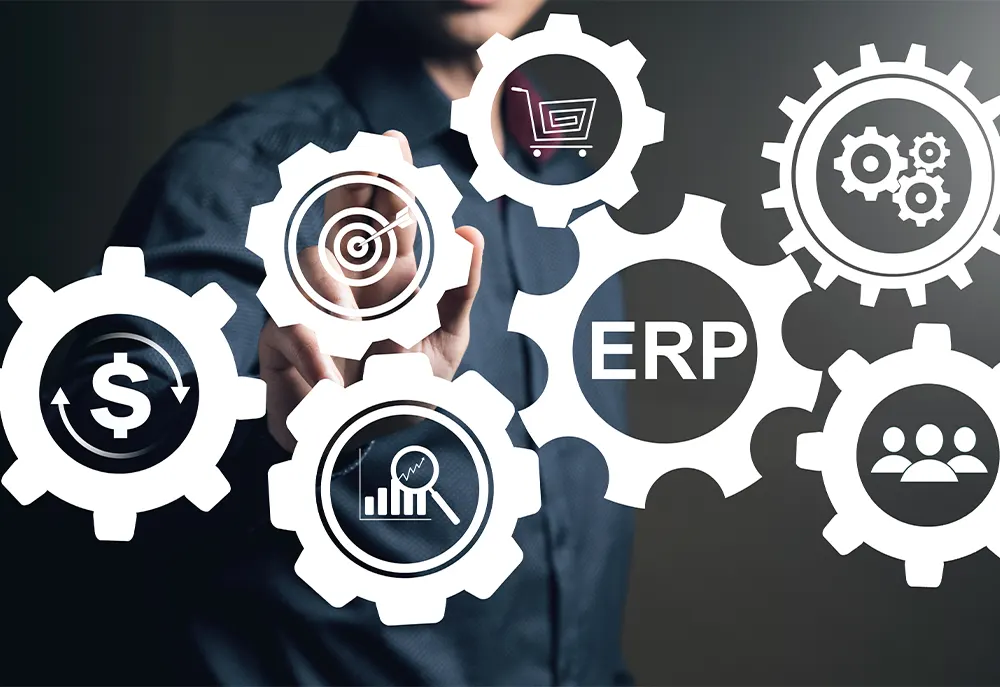E-commerce is experiencing rapid growth, pushing companies to turn to efficient technological solutions. Among these, ERP (Enterprise Resource Planning) has become an indispensable tool for any business looking to optimize its internal processes while ensuring smooth management of its online activities. Therefore, integrating ERP with E-commerce not only improves the management of inventory, orders, and customer data but also automates a large portion of daily tasks, thus maximizing operational efficiency.
In this article, we will explore the importance of ERP in an e-commerce business strategy, detail the different steps to connect these two systems, and see how a well-managed ERP and e-commerce synchronization can transform the operations of an online store.
What is an ERP, and Why Is It Essential for an E-commerce Strategy?
Before delving further into the ERP and website duo, it’s essential to briefly summarize what ERP is. An ERP (Enterprise Resource Planning) is software that centralizes and manages all of a company’s internal processes, such as:
- Inventory management: real-time tracking of stock levels and replenishments.
- Accounting: management of financial flows, payments, and generation of financial reports.
- Human resources: tracking of leave, payroll management, and employee performance evaluations.
- Sales: order automation, invoice management, and customer relations.
In the e-commerce context, an ERP becomes essential for centralizing and automating tasks. Once synchronized, ERP and E-commerce allow smoother operations management and significantly reduce human errors.
So, why is an ERP crucial for an e-commerce site? E-commerce businesses must juggle many simultaneous processes: order management, inventory, customer tracking, payments, etc. Using an ERP in this context has several advantages:
- Process automation: reduces manual tasks, saving time and optimizing resources.
- Real-time visibility: instant tracking of sales, inventory, and finances, ensuring faster decision-making.
- Improved customer experience: ERP ensures that information on the e-commerce site (inventory, delivery times, promotions) is always up-to-date.
In summary, coupling ERP with E-commerce improves overall business efficiency while optimizing the user experience.
ERP and E-commerce: How to Connect Them?
It is essential to properly connect ERP and your website to ensure smooth, automated management of business processes. Successful integration synchronizes key data in real-time, such as inventory, orders, and customer information, reducing errors and optimizing operations.
This not only ensures better internal resource management but also improves the customer experience, with up-to-date product information and more responsive logistics. In short, connecting ERP and your website is crucial for the performance and growth of any online business.
Integration via API
APIs (Application Programming Interfaces) are powerful tools that allow the ERP and e-commerce platform to communicate with each other in real-time. An API ensures the automatic transmission of key data, such as orders, customer information, or inventory levels.
- Advantages: Flexibility and real-time data updates. Every change made in one system is automatically reflected in the other.
- Example: When a customer places an order on the site, the ERP is immediately informed and adjusts the stock accordingly.
Native Connectors
Some ERP and e-commerce platforms have native connectors that make integration easier without needing custom development. These connectors allow for automatic data synchronization.
- Advantages: Quick installation and automatic updating of information between the two systems. Ideal for businesses with standard needs.
- Example: A connector between Shopify and SAP allows for the synchronization of customer data, sales, and inventory.
Middleware or Integration Gateways
Middleware is an intermediary solution that links ERP and E-commerce. In essence, this solution is useful when the two are not naturally compatible. This software converts data to make it readable by both systems.
- Advantages: Ideal for companies using proprietary systems or with complex integration needs.
- Example: Middleware is used to synchronize a custom ERP with a unique e-commerce site.
Priority Synchronization Points
When connecting an ERP and e-commerce, certain elements must be synchronized to ensure the system functions properly:
- Inventory: real-time synchronization to avoid stockouts or selling unavailable products.
- Orders: to ensure efficient order processing, from validation to delivery.
- Customer information: to personalize offers and manage purchase histories.
- Prices and promotions: to keep both systems consistently aligned on pricing.
ERP and E-commerce: The Key to Success for Online Stores
In e-commerce, where transactions grow quickly, integrating ERP with e-commerce plays a central role in business efficiency. Here are the main advantages of successful synchronization for online sales platforms.
Real-Time Inventory Management
Inventory management is one of the main challenges for e-commerce sites. Thanks to ERP integration, stock levels are constantly updated. Each sale made on the e-commerce site automatically adjusts the inventory in the ERP, thus preventing overstocking or stockouts.
Automation of Orders and Logistics
When orders move from the website to the ERP, they are immediately processed, speeding up preparation, shipping, and delivery processes. This reduces lead times and improves customer satisfaction.
Financial Data Synchronization
The integration between this two tools allows for online payment tracking, automated billing, and customer account management directly from the ERP. This ensures accurate and up-to-date accounting and facilitates the company’s financial audit.
Customer Personalization and Loyalty
When synchronized with a CRM (Customer Relationship Management), ERP centralizes all customer data (order history, purchasing preferences). This allows for personalized offers, increasing conversion rates and customer loyalty.
ERP and E-commerce: A Winning Combination to Boost Your Business Performance
Synchronizing an ERP with an e-commerce platform offers considerable advantages in terms of process management, automation, and data accuracy. Whether for optimized inventory management, centralized accounting, or personalized offers, this integration radically transforms the way a business manages its online activity.
However, implementing such an integration requires advanced technical skills and a deep understanding of the company’s needs. This is why it is crucial to call upon experts to assist in synchronizing your two tools.
At Webize, we help you maximize the efficiency of your online business through a custom integration. Contact us now for a personalized consultation and boost your e-commerce performance!






